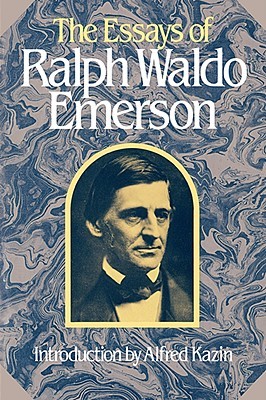Ralph Waldo Emerson and Emily Dickinson's Immediate Impact on Counterculture in America
Emerson Challenges the Status Quo
One aspect of Ralph Waldo Emerson's Transcendental beliefs is that there should be complete withdrawal from society. When doing this, however, a person must be completely engaged in nature. According to Emerson, the only unity that can be achieved with God is through nature. However, this was not the view of the Unitarian Church, in which Emerson's father was an ordained minister. Despite this disagreement with his father and the Unitarian Church, Emerson could not help but be influenced by his father's ideology. Having a minister for a father affected Emerson's work, consciously or not.
The Divine Live Amongst Us
Emerson draws parallels to the Holy Trinity in the body of his writing that cannot be ignored. In Emerson's essay "The Poet", the theme of The Father, The Son, and The Holy Spirit is replaced the "The Knower", "The Doer" and "The Sayer". In Emerson's view, these three characteristics must be unified in an ideal poet. Emerson takes language from the Bible to convey his ideas. In the case of "The Poet", Emerson's biblical references are in relation to the concept of the ideal poet.
Poetry 101 Via Emerson
According to Emerson, what we know but cannot articulate effectively is the responsibility of the poet to explain. At the time "The Poet" surfaced, originality was a concern of nineteenth century writers. Emerson knew that translation of original thought to the written word is seldom in an ideal state. Writing poetry was an attempt to solve this problem. According to Emerson, the poet is aware of our secrets, implying that the poet must explain the human heart through art or writing. The poet must explain the relationship between the spiritual and material world.


Falling Flat
Unfortunately, Emerson's efforts to achieve what he believed to be true, regarding poetry, were not effective. For example, Emerson's poem "Days" attempts to convey Transcendental beliefs. In the poem, his poetic voice is as analytical as his essay writing.
"Days"
Daughter of Time, the hypocritical Days
Muffled and dumb, like barefoot dervishes
And marching single in an endless file
Bring diadems and fagots in their hands.
To each they offer gifts after his will,
Bread, kingdoms, stars, and sky that hold them all
I, in my pleached garden, watched the pomp
Forgot my morning wishes, hastily
Took a few herbs and apples and the Day
Turned and deputed silent. I too late,
Under her solemn fillet saw the scorn
Emerson's Transcendental beliefs are hard to judge and conclude in the poem. The idea the people are "Daughters of time", seems to suggest that nature is the timeframe humans operate under; "Muffled and dumb" implies that material desires may stunt the process of learning. Another aspect of the poem reflects on the life Emerson lives: "I in my pleached garden, watched the pomp". By saying he "Took a few herbs and the day", is symbolic of Emerson having to power to control his identity. The last line of the poem however, appears to be a reflection that no matter how much he spreads his ideas of Transcendental thought, people will choose not to listen to him. The process of reception from others is always problematic, as I will explain later in this hub.
Now What?
Emerson also discusses the after-effects of revelation, or reaching an epiphany in "The Poet". To Emerson, revelation is achieved through a detachment from society; there is a certain ecstasy that can also be achieved through a oneness with nature. A passage in one of Emerson's essays reflects this idea. By saying, "I become a transparent eyeball", Emerson suggests oneness. However, there is also fear associated with the epiphany. According to Emerson, everything in nature must answer to a moral power. Because of the duality of fear with revelation, however, moral flaws can shatter the sense of oneness with nature. Although using references to explain such a phenomena, Emerson's writing only draws the reader to the surface of God, because a direct encounter with God would lead to either death or insanity.
Partners in Crime
The other major contributor to the Transcendental movement was Henry David Thoreau. Although he didn't campaign and lecture to the extent Emerson did, he still had a strong, almost religious belief in the richness that nature holds. Emerson encouraged the young Thoreau to write after graduating from school. Almost considered his protégé, Thoreau soon became well versed in the ideas of Transcendentalism. Thoreau's book Walden is considered one of the finest depictions of nature and human involvement ever made. Thoreau wrote through experience and observation, and in the process allowed for the reader to become more aware of the internal and external world by blurring these two states of mind. Walden pond was the center of Thoreau's universe; he referred to the pond as the place between earth and heaven. In Walden, nature centralizes solitude. Thoreau is deeply concerned with the notion of loss through the demise of modern society. Thoreau believed that technology, such as railroads, can corrupt man's pursuit of unity with God. Just as soon as he explains loss, Thoreau tries to contain the loss. Thoreau is aware that dwelling about loss is not a healthy way to think and one must recover from this feeling. As a coping mechanism, Thoreau employs a cyclical time frame to contain his notion of loss. With a cyclical time frame, a sense of rebirth can be achieved.
Similar Philosophies
An aspect of Thoreau's writing that mirrors Emerson's is Divinity in language. Thoreau believed that the reader should be as engaged with Walden as if reading scripture. A primary difference between reading scripture and reading Walden is that the perfect vision with God is not realized. The reader should live in the hope that this unity might occur, but ultimately once a perfect realization occurs, the notion ceases to exist.
Examining Walden
In Walden's chapter "The Ponds", the images of inversion regarding the notions of "Sky Fishing" are created to disorient the reader. Only through disorientation can the reader reclaim a greater sense of identity. Thoreau loves nature so much that he objects to giving his natural surrounding any form of a name. Naming such invaluable resources would be foolish and "violent". An aspect about Thoreau's writing, which is interesting, is that if the same people everyday constantly surround us, the relationship becomes phony or cheap. Distance between people allows for the retention of value.
Transcendental Thought Is Not For Everyone
In my opinion however, the Enlightened tend to dismiss those who have yet to experience an epiphany. Because of this, there is a disconnection from others who haven't shared a similar life-altering event. Thus, because of revelation, there is a tendency towards isolation. Another aspect of Transcendental writing that presents problems is that it is too consumed with the ecstasy surrounding a revelation or magical thinking. Ideally, there should be a shared understand between both, as long as it doesn't create problems. Unfortunately, when the revelation is so profound, seldom does this happen.
Observation and Experience Also Extended to the Counter-culture World of Drugs
Transcendental thought was an influence of contemporary writers. Beat poets such as Allen Ginsburg attempted to convey aspects of Transcendentalism such as unity with God and intuition. However, Ginsburg's process of self-examination become corroded in his writing that suggests he may have taken the fundamental aspects of Transcendentalism out of context. His notion of what it means to be enlightened became too self-absorbed. This behavior could be classified as Solipsism-the idea that that "the self is all that can be known to exist". Emerson, unlike Ginsburg, was an abstainer from drugs and alcohol, claiming that "The imagination is the best intoxicant". However, the result of a careless imagination, sober or not, can be quite disturbing.
Dickinson Emerges as the Antithesis to the Carelessly Enlightened

Quick Points
*Emerson believed intuition was the key to understanding God
*Dickinson felt God was far away
*Emerson, Thoreau, and Dickinson created radical prose and poetry that had never been seen before
The process of reception from others must be addressed because people are not naturally receptive to new ideas. An example of this was the initial reaction to Emily Dickinson's poems. Although not a student of Emersonian thinking, her writing suggests self-examination and striking a balance with nature. Dickinson was critical of Emerson's optimistic, almost naïve view of society. Dickinson is a skeptic in comparison of Emerson. Through her poems, there is a sense of fragmentation and disconnection, where Emerson focused in longer essays on a notion of cyclical time patterns. The compression in Dickinson's work denominates density and compactness, which makes the reader do more interpretative work; the reader is forced to interpret the work in a disjointed way. Dickinson also used dashes in her work that suggest isolation and unity, possibly at the same time. The brokenness of her grammar is purposely constructed this way to show a brokenness of thought. Her writing style is a critique of traditional writing structures at the time. What separates her from Transcendental thought is that she sees no resolution to cultural and ethical problems, where Emerson does. The cyclical prose of Emerson is in sharp contrast to her use of fragmented density in her poems. There is also a fundamental difference between how Emerson and Dickinson perceive God. To Emerson, God is within and our intuition is the key to a better understanding of God. To Dickinson, God is far away. Intimacy is also distant and her writing reflects on the distance between the self, nature and God. However, there is a similarity with Dickinson to Transcendentalists in that both were deeply connected with the organic process of writing. Both Dickinson's writing and Transcendentalist writing were highly experimental.
Originally, only six of Dickinson's nearly seventeen hundred poems were published. However, her poems were altered by her editors to appear more flowery and less dense. Because of this, she understandably withdrew from the public and wrote the majority of her poems in private. It is important to state that she was not isolated due to lack of intellectual capacity. She simply did not share in the same enthusiasm regarding revelation as those writing at the time did.
Ultimately Unsatisfying
Emerson's notion of what the poet must represent may too idealized and ambitious. The absolute poet cannot exist in Emerson's ideal, although he optimistically anticipates the poet of his imagination to surface. Emerson's descriptions of what the poet must represent impossible paradoxes. He claims that the poet must be living in isolation; however, he also believes the poet must be able to represent the whole community. He also claims that the poet must be talented. However, not long after he makes that point, he contradicts himself by saying, "Talent may frolic and juggle; genius realizes and adds". It is confusing to conclude if the poet must be talented, a genius, or both. If Emerson had difficulty finding the true poet when he was alive, imagine how frustrated he would be today. By his own admission, Emerson was weary of critically minded people, who to him are also consumed with material things, referring to them as being "infested with a can't of materialism". Emerson and most Transcendentalists frowned upon materialism (a philosophy that considered everything is material or in a state of matter) because materialism denies that the human body is spiritual or in any way non-material. In the end, the core beliefs of Transcendentalism are important: Intuition and unity with God through nature. Emerson may have not have been a great poet, or as good of a writer as Thoreau, however, a majority of his ideas still apply to modern society.



